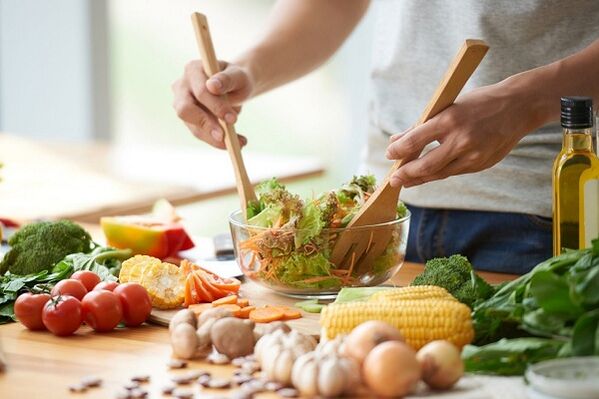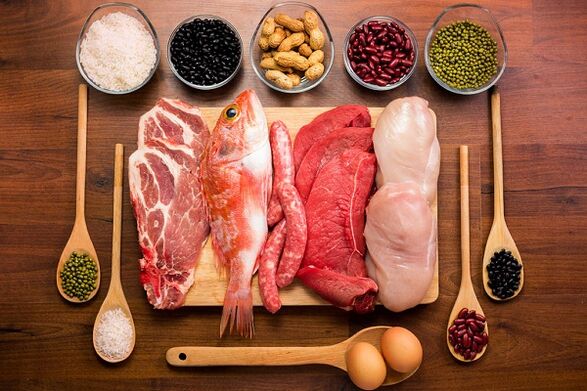Providing proper nutrition for various diseases is an important part of rapid recovery. The diet of prostatitis and prostate adenoma can improve the body's condition and help combat many uncomfortable symptoms in men. Conversely, eating errors can exacerbate the symptoms of discomfort and increase the discomfort caused by prostate disease.
Nutritional characteristics of prostatitis
The main role of correct diet in prostate inflammation:
- Prevent irritation of the pelvic organs, thereby exacerbating inflammation.
- Enhance the function of the immune system.
- Normalization of the digestive tract.
- Reduce the urge to urinate, especially at night.
- Prevents prostate sclerosis by restoring blood flow and providing nutrients to the organs.

Therapeutic diet includes:
- Enrich your diet with healthy products.
- Establish a drinking method (at least 2-2. 5 liters of filtered water per day).
- A combination of "healthy" food and physical exercise (such as physical exercise).
- Compile separate menus for the "deterioration" and "mitigation" phases.
- Reject bad habits completely.
Useful products
The proper nutrition for male prostatitis is to eat foods that help speed up the healing process. Detailed advice provided by medical experts.
The following should be added to the diet:
- All varieties of nuts.
- All kinds of dried fruits.
- Lean meat.
- Parsley and other fresh herbs.
- Red fish.
- Vegetables.
- Vegetable fat.
- Non-acidic fruits.
- Grey bread.
- Buckwheat/oatmeal.
- Fermented roasted milk, kefir and cheese.
- Fruit preserves.
- Honey.
- Fresh juices (especially asparagus).
- Parsnip.
When forming a daily diet menu, one must pay attention to the amount of fiber consumed. This is important for normal bowel movements (the human body excretes feces from the digestive tract). You should also eat zinc-fortified foods. Trace elements increase resistance to infection and improve the quality (and quantity) of semen.
Under stable conditions, the following operations are allowed:
- Mushrooms.
- Spices.
- Some fried foods.
- Dry wine (1-2 times a month, 100 ml each time).
Food Contraindications
When diagnosed with prostatitis, men are prohibited from the following behaviors:
The following products are also contraindicated:
- Fast food.
- Thick soup.
- By-products.
- Mushrooms.
- Peppers, garlic and onions.
- Kimchi.
- Spicy food.
- Smoked products.
- Fatty pork and lamb.
- Bake.
- Sour fruit.
- Foods containing chemical additives.
- Carbonated drinks.
- Spices.
- Candy.
Men's Prostatitis Diet: A Weekly Menu
The diet will vary according to the stage of prostatitis. The nutrition of chronic prostatitis may be more diverse. The following table lists an example of a weekly menu for men in remission.
| Breakfast | Lunch | ||
| Monday | Cabbage and carrot salad; oatmeal; fruit juice. |
Vegetable soup; Beef stew and vegetable stew; some fruits. |
curd shortbread; fresh apple juice. |
| Tuesday | Cucumber and vegetable salad; Millet porridge; Cherry compote. |
Shrimp and vegetable soup; Steamed meatloaf with mashed potatoes; Tea with honey. |
fried dough sticks; berry salad seasoned with sour cream. |
| Wednesday | Buckwheat; Cucumbers and tomatoes; Morse |
Borscht in vegetable soup; Boiling breasts; Garlic salad; green tea. |
Carrot Cake; Sour Spoon; Kissel among fruits. |
| Thursday | Vinaigrette; Pumpkin Seed and Dried Apricot Cake; Chinese medicine decoction. |
Fresh cabbage soup; Boiled rabbit with vegetable decoration; Sweet orange. |
Steamed fish; Celery stew; Apple compote. |
| Friday | Milk soup; Cheese dry bread; Mint tea. |
Chicken soup; Veal stew with potatoes; tomato. |
Berry pancakes; 2 tablespoons of low-fat cheese. |
| Saturday | Polenta with dried apricots; boiled eggs; Fresh orange juice. |
Vegetable Turkey Soup; Steam Meatballs; Candied dried fruits. |
Potato casserole; Lettuce leaves with olive oil. |
| Sunday | Baked potatoes; Salad with peeled pumpkin seeds; Chinese medicine decoction. |
Cheese soup; Buckwheat steamed fish; Green tea or white tea. |
Vegetable cutlets; Fruit juice. |
In the context of worsening illness, nutrition should be gentle. Nutritionists recommend the following options:
- Breakfast. Buckwheat porridge "coated", jelly;
- Lunch. Cabbage soup, boiled fish, beet salad, unsweetened tea;
- Dinner. Steamed chicken meatballs with cooked vegetables and preserves;
- Overnight. A small portion of homemade yogurt.
The following menu will also work:
- Breakfast. Oatmeal with a little honey, cherry jelly;
- Lunch. Tomato soup, light vegetable salad, a slice of low-fat cheese grain bread, green tea;
- Dinner. Zucchini stewed eggs, freshly cooked fish fillets;
- Before going to bed. Strawberry juice.
The following diet is suitable for antibiotic treatment:
- In the morning. Tofu casserole with berries and herbal tea;
- days. Carrot salad, chicken soup, boiled rabbit and vegetables;
- At night. Roasted vegetables, bananas and apples;
- Overnight. A cup of yogurt.
How to properly consume BPH?
- Lack of hunger and weight correction;
- In the case of obesity, choose food to ensure weight loss;
- Various menus, which contain essential trace elements and vitamins.
- Divide the daily food intake into 4-5 meals;
- Avoid food before going to bed.
The main focus is on products that help reduce benign tumors. Eliminate any food that increases the burden on the bladder and causes (or even indirectly) the inflammatory process.

BPH’s eating disorders bother men:
- Constipation or diarrhea.
- Bladder irritation.
- Increased risk of prostate secretion and blood stagnation.
Sometimes men who are diagnosed with prostate adenoma will choose sports nutrition because it is the most balanced nutrition. It is important to understand that it was developed for healthy people (except for the main food) and is not suitable for situations where pathological processes exist in the human body.
BPH Nutrition Guide:
- The food should be consumed at about the same time.
- There should be no feeling of overeating.
- Diet is calculated separately for each person.
- The main focus is on foods containing fiber and zinc.
- Eliminate foods that have a negative impact on the immune system.
- Your diet depends on whether you are treated with medication or surgery.
Include foods useful for BPH in your diet:
- Vegetable fat.
- Weight loss meat.
- Roasted or unprocessed vegetables and fruits. It is especially important to add cucumbers, pears, kiwis, potatoes, watermelons, bananas and dates to your diet.
- Fermented milk products.
- Pomegranate, carrots, beetroot, cranberry and tomato juice.
- Mussels, fish, seaweed.
Like prostatitis, drinking is also important. You need to drink about 2. 5 liters of water every day.
Experts suggest rejection:
- Fast food.
- Smoked cheese.
- Milk.
- Store fruit juices and sugary drinks.
- Chili.
- Garlic.
- Candy.
What do men say?
On the Internet, you can find comments made by men talking about their experiences with prostatitis and BPH. In addition to information about medications, patients can also share the results of their diet in their comments.
"I have been suffering from prostatitis for more than 5 years. During this time, I did not try anything. I went to see a doctor and took self-medication, which made no sense. For myself, I noticedWhile maintaining the correct lifestyle (I am talking about nutrition now), the frequency of recurrence is much lower, and the possibility of recurrence is not so obvious. The most important thing is to exclude alcohol, do not smoke if possible, and as usualRemove fried, salty and spicy food. "
"Six months ago, I started experiencing severe urination problems. I went to the doctor and he said I had prostatitis. First, he warned me that treatment and recovery depend on my diet and activity level. There is no prostate. Traces of inflammation. I believe that diet has contributed the most to the effectiveness of the treatment. "
"Prostate adenomas are spreading quietly. The doctor said that surgery at my age is not recommended (in addition, I have heart problems). He prescribed medicine and advised him to take more fresh air, adjust his diet, write down what he can eat andI can’t eat anything. He strictly forbids drinking. I feel good and even have an erection. My mood improves and I want to rejuvenate. ”
























